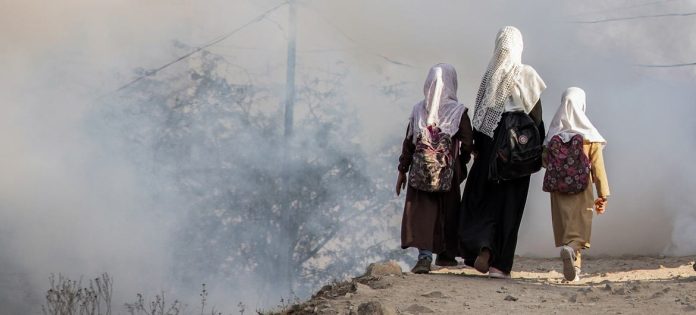Aid agencies are seeking nearly $4.3 billion to help 17 million at today´s High-Level Pledging Event on the humanitarian crisis in Yemen. Sweden, Switzerland and the United Nations co-host today´s event in Geneva.
Seven years of conflict and economic collapse have devastated the country and exhausted people’s coping capacities. Meanwhile, unprecedented funding shortages have forced humanitarian organisations to cut lifesaving aid over recent weeks, including food, clean water, healthcare, and protection. In short, this means fewer people are receiving the help they need at a time when they need it most.
Critical opportunity

An infant is treated for malnutrition at a hospital in Sana’a, Yemen.
The high-level pledging event for Yemen will represent a critical opportunity for the international community to demonstrate its continued commitment to the people of Yemen.
Yemen is living in a chronic state of emergency, marked by hunger, disease and other miseries that are rising faster than aid agencies can reverse, UN relief chief Martin Griffiths told the UN Security Council on Tuesday, as the Special Envoy for the country called for joint efforts by Yemenis and the international community to break the entrenched cycle of violence.
Emergency Relief Coordinator, Mr. Griffiths, cited grave risks for inertia and fatigue in attenuating the severe conditions in Yemen, as Russia’s invasion of Ukraine provokes new shocks and international outrage.
$4.3 billion needed
At today´s pledging event, António Guterres, Secretary-General of the United Nations, will deliver an opening statement. Among other speakers are Ann Linde, Swedish Minister for Foreign Affairs and Ignazio Cassis, President and Foreign Minister of Switzerland, as well as Maeen Abdulmalik Saeed, Prime Minister of Yemen and UNHCR Special Envoy Angelina Jolie.
New nationwide assessments confirm that 23.4 million people now need assistance – about three of every four people. Among them are 19 million people who will go hungry in the coming months – an increase of almost 20 per cent from 2021 – while more than 160,000 of them will face famine-like conditions.
Yemen relies on commercial imports for 90% of its food and nearly all its fuel. One third of its wheat comes from Russia and Ukraine, where the conflict sparked on 24 February may push food prices, which already doubled last year, even higher.
Funding shortfalls have forced cuts

An infant eats supplementary food at a World Food Programme distribution point in Mokha, Yemen.
WFP was forced to reduce food rations for eight million people at the beginning of the year due to a shortage of funds, David Beasley head of WFP told the Security Council yesterday. WFP is currently only 11 percent funded and needs more than $887.9 million to provide food assistance for 13 million people over the coming six months.
75% of the $14 billion generated by United Nations appeals has come from six donors – the United States, Saudi Arabia, the United Kingdom, the United Arab Emirates, Germany and the European Commission.
“If we have one message for the world today, it is this: do not stop now,” Martin Griffiths the UN relief coordinator says. „Member States must demonstrate that out of the headlines does not mean left behind”.




